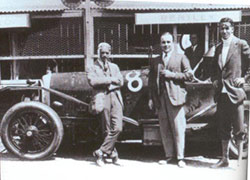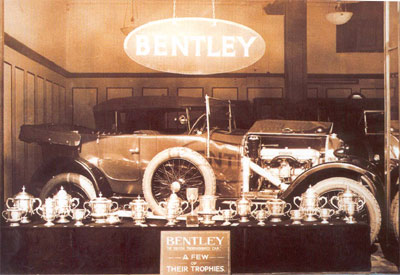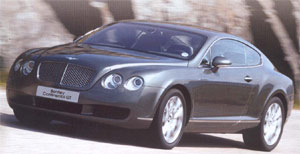|
After living in the shadow
of Rolls- Royce for so long, Bentley Motors is enjoying
a renaissance with a new owner and, most importantly, a
new product range, which is literally setting pulses
racing across the region.
Since Volkswagen acquired
Bentley in July 1998, its German owner has invested
heavily in the brand and introduced the Continental GT -
a 'baby Bentley' that has all the hallmarks of the
exclusive motor manufacturer at a price substantially
lower than its more traditional Arnage range.

The 200 mp/h 'supercar'
still remains out of the price range of most - and the
maxim 'if you need to ask, you can't afford it' still
applies - but it is hot. Order a Continental GT coupé
today and you'll not take delivery until March 2005,
despite the fact that the car will be produced at a rate
of 3,500 per year, which represents a huge amount for
Bentley.
With a four-door model due
for release next year and a convertible to follow that,
Bentley has high hopes for the future of the Continental
GT, and is targeting a record five-fold sales surge in
the GCC region this year alone. The United Arab Emirates
accounts for some 30 per cent of Bentley demand in the
Gulf, and is the top importer in the region followed by
Kuwait and Saudi Arabia.
For Al Habtoor Motors, the
exclusive Bentley Motors dealership in the UAE, the
excitement is being matched by increased investment in
showrooms and after-sales service. A dedicated Bentley
showroom opened in Dubai last year and the dealership is
now looking to develop new facilities in Abu Dhabi.
Regional manager, Mark
Llewellyn-Jones, is understandably upbeat and says local
demand for the new Continental GT has been
unprecedented, with orders having rolled in long before
its regional launch in March.

"We have had people
waiting two years for it," he explains. "Certainly the
anticipation and the deposits we received up front
surprised us, as it is very rare in this market to get
people to commit with money for something they hadn't
seen and, at that stage, didn't know how much was going
to cost."
Bentley conducted private
viewings of the Continental GT around the world a year
before its official launch, but it was only unveiled to
the general public in the Arab world at the Middle East
International Motor Show in Dubai in December 2003 -
which resulted in a further 22 orders being taken at the
show.
"The outlook for the next
three or four years is mind-blowing because of the rate
of increase and expansion. This year is looking very
good and the four-door derivative of Continental coming
next year will be a real winner as this is far more a
four-door market than a two-door market."

According to Mr Llewellyn-Jones,
to fully appreciate the passion exhibited by Bentley
enthusiasts, you have to understand the company's
background.
"Personally I think the
tradition and history is everything," he says. "When you
sit in the Arnage it has an aura, even a smell - just
the feel of it is so different from any other car and
you can't help but get swallowed up by it all."
The history of Bentley
Motors dates back to 1919 when Walter Owen Bentley,
affectionately known as 'W.O.', enlisted the services of
two engineers and turned his hand to designing and
building a prototype sports car - something he had
passionately wanted to do for many years.
The car - called the
Bentley 3 Litre - was put into full production at its
London factory in 1922 and, in the same year, a team of
three racing Bentleys won the team prize in the Tourist
Trophy Race. The following year, a Bentley car finished
fourth in the 24-hour sports car race at Le Mans and
went on to win it the following year. During the next
six years, teams of Bentleys were entered for each
24-hour race at Le Mans and, although the 1925 and 1926
teams failed to finish, Bentleys were first across the
finish line in 1927, 1928, 1929 and 1930 to set a record
of consecutive wins that was not equalled until the
1950's (by Jaguar) and not beaten until the 1960's (by
Ferrari).
Away from the racetrack,
however, things were not going so well. The depression
of the 1920s, combined with W.O.'s general lack of
business acumen, had so badly affected sales that the
Bentley Company was forced into liquidation in 1931 and
taken over by Rolls-Royce. Production of Bentley cars
was subsequently moved to Derby, and ultimately in 1946
to its current home at Crewe in the North West of
England.

Until the late 1950s,
Bentley and Rolls-Royce maintained separate identities
with the Rolls perceived as a chauffeur-driven
limousine, while the Bentley was very much the
gentleman's Grand Touring machine that was actually
driven by its enthusiastic owner.
"From the 1960s there was
a greater fusion of the two brands whereby the Bentley
was essentially the Rolls-Royce with a different
radiator and badge," Mr Llewellyn-Jones explains. "That
carried on right through until the early 1990s, but in
the mid-90s there was a change with Bentley coming out
of the shadows with cars like the Turbo-R. Whilst it
looked like its Rolls-Royce partner, it drove very
differently. It had a turbo charged engine that made it
really go. The cars didn't handle or stop particularly
well in those days, but it was the beginnings of getting
back to the self-driven, big, expensive, luxury,
high-speed, touring-type car."
Bentley cars have always
been more understated and attracted a distinctly
different type of owner than Rolls-Royces and, with the
divorce of the two brands now complete, Bentley is
finally able to concentrate on carving its own
individual identity once more - Rolls-Royce is now owned
by BMW and production of its only current model has
moved to Goodwood in the south of England.
"Although we have
customers in the UAE who have both Bentleys and the new
Rolls-Royce Phantom," Mr Llewellyn-Jones says, "there is
a core of Bentley people who are different from the core
of Rolls-Royce people. They are generally slightly
younger, obviously wealthy, but somebody who enjoys the
performance that the Bentley gives them, who appreciates
and understands the bespoke side of things, and wants to
make a statement without being over-the-top about it.
"In Crewe they have a
saying that 'one is flash cash, and the other is wealth
by stealth'. That is a little bit clichéd, but it does
symbolise some of the difference between the two
brands."
Bentley engines are
predominantly hand-made and the interiors hand-finished,
while customers are also able to tailor their vehicle to
their own individual requirements.
"It is probably one of
only two totally bespoke car manufacturers left in the
world, and we have a regular customer base who will
tailor-make their own car," Mr Llewellyn-Jones says. "If
you have a big enough cheque book you can have whatever
you want - if you took a lady's lipstick and said 'I
want the leather that colour with the piping to match my
shoelaces' it can be done."
Among the Bentley
characteristics are power and speed: the latest series
of Arnage four-door salon car is as fast in a straight
line as a Porsche 911, yet it is a limousine-type
motorcar weighing 2.8 tonnes. It is no wonder then that
owners like to drive them themselves.
"The Continental GT is
definitely not a chauffeur driven motor car either," Mr
Llewellyn-Jones says of the new model. "The car is
extremely fast and has the Bentley DNA - the interior
looks, smells and feels like a Bentley. The engine is
not totally silent - they have engineered it so you can
hear it a little bit, which is what the cars were always
about."

And he says the waiting
list new customers have to join for the new Continental
GT only adds to the exclusivity of the Bentley brand.
"Crewe are actually
working a two-shift system to meet initial demand, but
they then have to back off a little bit because you
still want to maintain the balance of demand being
slightly higher than supply - that's the ideal
situation. If you have to wait just a little bit, it
does mean that the car remains exclusive and its value
and re-sale value remain intact."
| 